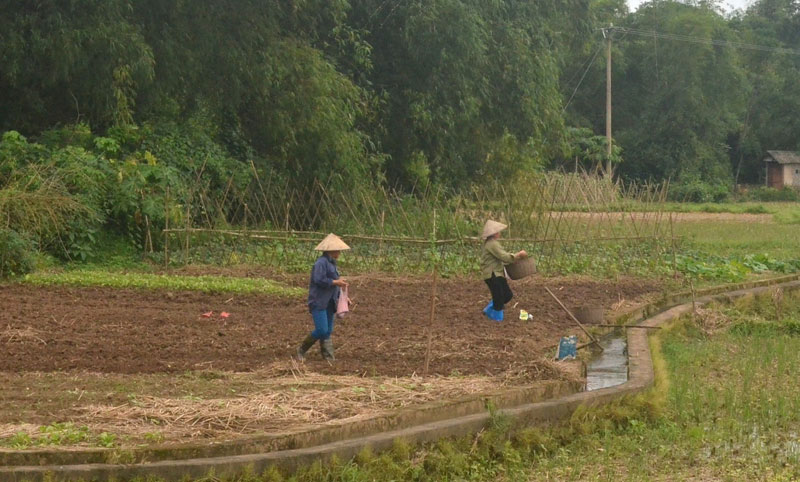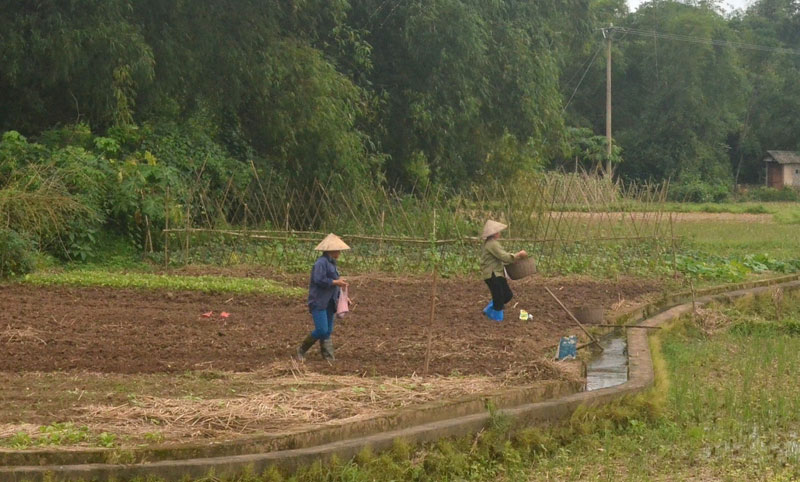
(HBO)– Bo village in Trung Bi commune (Kim Boi district) has a large alluvial area running along a spring always full of water. The fertile land has never been left uncultivated in any winter crop. And this year is the same. Although in mid-October, spring water level rise due to the historic flood submerged all corn areas that had been planted over 10 days earlier, local farmers were still determined to not let land free in this winter crop by growing new plants when the water dropped.

Farmers in Bo village, Trung Bi
commune grow vegetables and beans on corn areas damaged by flood.
According
to statistics of the People’s Committee of Trung Bi commune, the commune had
about 83.6 ha of winter crops damaged by flood, including corn, sweet potato
and vegetables of the Brassicaceae family. When the rain was over and water
dropped, local farmers went to the field to restore production by replanting on
damaged areas. As the time was not long enough to grow moisture-loving plants
such as corn, peanuts, soybeans, and cucumber, the commune shifted the
plantation to winter plants like sweet potato and vegetables, with the targeted
area of over 100 ha.
like
Trung Bi, other communes in Kim Boi district are surmounting flood consequences
to produce winter crops. Although extreme weather damaged over 430 ha of plants
and slowed down production progress, local farmers were not discouraged. At
present, the People’s Committee of Kim Boi district has made a list of communes
to provide vegetable seeds for them with a total of more than 1.3 tonnes. As
scheduled, the town and communes continue expanding vegetable areas, with the
focus on the Brassicaceae family such as Sa Pa cabbage, Japan kohlrabi and
Sakata Brassica integrifolia.
Deputy
head of Kim Boi district’s Division of Agriculture and Rural Development Bui
Van Bo said that: "winter crop production often takes place in difficult
conditions, especially when bad weather affected the locality from the
beginning of the season. In this situation, all communes strived to fulfil the
set targets with a total area of 2,060 ha. To do this, the Division of
Agriculture and Rural Development advised farmers to use the varieties having
short growth time with the focus on white corn (as it can be used as food for
buffalos and cows), sweet potato, potato, and vegetables as those plants can be
harvested early and have good consumption. Currently, the communes are speeding
up production and using plant protection measures to not only complete set
targets but also ensure the quality and output of winter crops./.
According to data from the Hoa Binh Provincial Party Committee, the industrial production index for the first six months of 2025 is estimated to have increased by 20% compared to the same period last year. This marks the highest year-on-year growth rate for this period since 2020.
In the first six months of 2025, Hoa Binh province’s export turnover was estimated at 1.145 billion USD, marking an 18.11% increase compared to the same period in 2024. Import turnover was estimated at $ 804 million, a 17.15% increase, which helped the province maintain a positive trade balance.
The lives of the ethnic minority farmers in Tan Lac district have gradually improved thanks to the new directions in agricultural production. This is a testament to the collective strength fostered through the professional associations and groups implemented by various levels of the district’s Farmers’ Union.
With the motto the "product quality comes first,” after nearly one year of establishment and operation, Muong village’s Clean Food Agricultural and Commercial Cooperative, located in Cau Hamlet, Hung Son Commune (Kim Boi district), has launched reputable, high-quality agricultural products to the market that are well-received by consumers. The products such as Muong village’s pork sausage, salt-cured chicken, and salt-cured pork hocks have gradually carved out a place in the market and they are on the path to obtaining the OCOP certification.
In the past, the phrase "bumper harvest, rock-bottom prices" was a familiar refrain for Vietnamese farmers engaged in fragmented, small-scale agriculture. But today, a new spirit is emerging across rural areas of Hoa Binh province - one of collaboration, organisation, and collective economic models that provide a stable foundation for production.
Maintaining growing area codes and packing facility codes in accordance with regulations is a mandatory requirement for agricultural products to be eligible for export. Recently, the Department of Agriculture and Environment of Hoa Binh province has intensified technical supervision of designated farming areas and packing facilities to safeguard the "green passport" that enables its products to access international markets.



